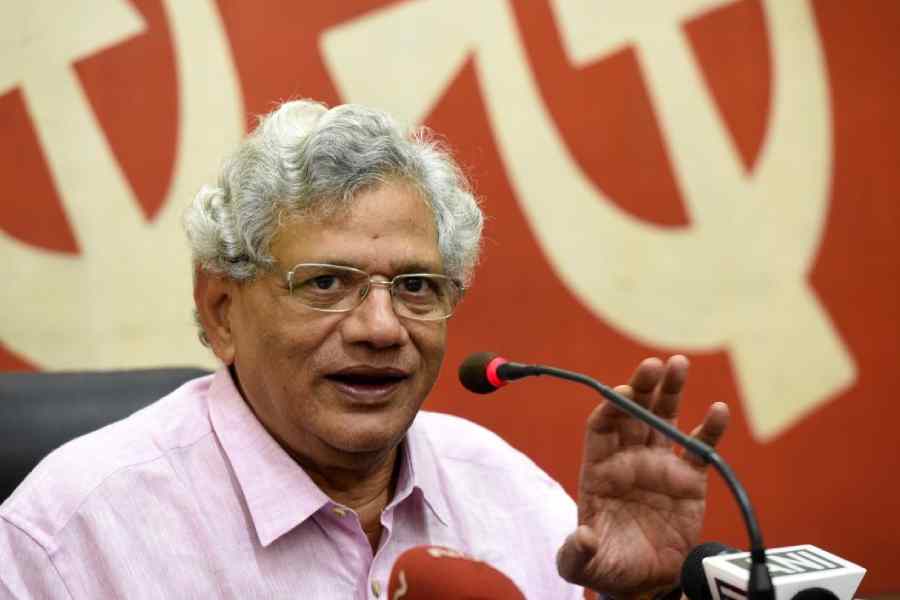Sitaram Yechury, the former general-secretary of the Communist Party of India (Marxist), who passed away on September 12, belonged to the first batch of MA (Economics) students of Jawaharlal Nehru University; the faculty at the newly-established Centre for Economic Studies and Planning consisted of six members of whom three, including myself, were in their late twenties with no previous experience of teaching in India while even our senior colleagues were only in their thirties. As the students were mostly turning twenty, the age gap between teachers and students was small; it was not unusual to see teachers and students sitting together at Centre events and a teacher cadging a cigarette from a student. This interaction remained a healthy one; each group was too caught up with its own preoccupations to cross boundaries.
Sita, as he was called, was a brilliant student invariably obtaining a clutch of A grades, including from such exacting examiners as Professors Tapas Majumdar, Krishna Bharadwaj, and Amit Bhaduri. He could have walked into an Oxbridge post-graduate programme or to an Ivy-League US university and easily obtained a scholarship to finance his study there; but he and the other bright students of his batch decided to remain at the Centre for their PhD, which was an immense boost to the Centre and to JNU. Indian universities can run excellent BA and MA programmes but end up being finishing schools for foreign universities; what they generally lack is a good research programme. Sita’s and his batchmates’ decision to stay on went a long way in making JNU the front-ranking institution it became. Sita, alas, did not complete his PhD; he became a party whole-timer midway through his research.
Sita’s affability, self-deprecating modesty, total lack of airs, gentleness, ready wit and absolute integrity have been much written about, but less noted has been his sheer joie de vivre. Georg Lukacs, the renowned Marxist philosopher, had once distinguished between two different revolutionary attitudes: the first, which apotheosised a life of ascetic austerity, was typified by Eugene Leviné, the martyred leader of the short-lived Bavarian Soviet Republic of 1918, who had famously remarked, “We Communists are dead men on leave”; the imminence of death, in other words must never be lost sight of by a communist. The second attitude was typified by Lenin who saw life, while being devoted to the revolution, as a source of joy; of course, a communist may not have the time and the resources to enjoy life to the full, but his was not a culture of renunciation. Sita firmly belonged to the second group: his interest in music, including film music (he was a great fan of the late composer, Madan Mohan), and in cricket (he titled his book containing several of his newspaper columns, Left-Hand Drive) were ample testimony to this.
His ability to negotiate alliances with political parties with different ideologies, which was especially evident during the recent struggle to preserve the secular and democratic nature of our polity against neo-fascist onslaughts by forming the INDIA bloc, has been widely noted. But this ability derived from a certain theoretical perspective. A revolutionary, committed to changing existing society, must of course be epistemically outside of it; but revolutionaries historically have also been in a physical sense outside of society, since their presence within it has not been tolerated by the repressive regimes characterising such societies. The majority of the Russian revolutionaries had been forced into exile and came back to Russia in a sealed train after the February Revolution to carry it forward. The Chinese revolutionaries were forced to retreat to the Yenan caves to survive Chiang Kai-shek’s repression. The Cuban revolutionaries had to operate from the Sierra Maestra mountain range against the Batista regime. Earlier revolutionaries, in short, had been both epistemically and physically outside the societies they wished to transform.
What distinguishes the present is that in many countries, revolutionaries are no longer physically forced out from their societies. They have to be epistemically outside society while remaining physically within it, which requires a change in their strategy and tactics. Instead of waiting for a social crisis that would facilitate their task, they have to contend with and relate to a range of groups and ideologies different from their own on a quotidian basis. The need to form alliances and united fronts with diverse groups as part of their normal modus operandi emerges from this. The range of groups that needs to be drawn into an alliance expands greatly when the country faces a neo-fascist threat; but the need for alliances is not confined only to periods of neo-fascist ascendancy.
This was Sita’s theoretical position. There is an ever-present danger that the modus operandi of a party that physically remains within society may well negate its epistemic exteriority, that it may get assimilated into quotidian politics in such a way that it loses sight of its basic objective of transforming society. Sita was conscious of this danger and sought to fight it. He used his formidable intellect to chart out a praxis for the party that is physically within society but must remain epistemically outside of it. His deep familiarity with the international situation, which he had developed during the years when he handled the CPI(M)’s international relations, also helped him in shaping his thoughts on these issues.
He was thus a true modern communist, a communist of our times, sensitive to the change that had occurred in the world but aware of the dangers it posed to his praxis as a communist. His is an irreparable loss.
Prabhat Patnaik is Professor Emeritus, Centre for Economic Studies and Planning, Jawarharlal Nehru University, New Delhi











